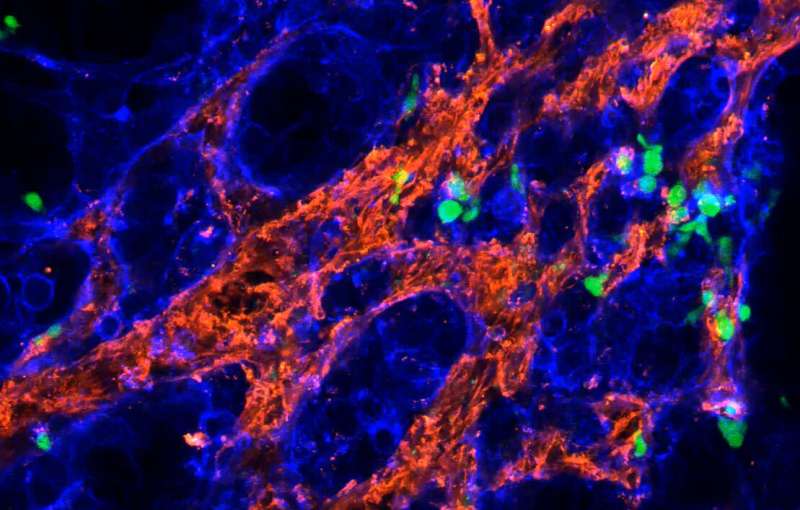This article has been reviewed according to Science X's editorial process and policies. Editors have highlighted the following attributes while ensuring the content's credibility:
fact-checked
trusted source
proofread
Gamma delta T cells can fight aggressive breast cancer

Triple-negative breast cancer (TNBC) is the most aggressive and deadly form of breast cancer with limited treatment options and a high probability of recurrence. Tumor growth and relapse of TNBC are driven by breast cancer stem cells, and improved therapies that can eliminate those hardy cells are urgently needed.
Researchers from the University of Frieburg have discovered that coordinated differentiation and changes in the metabolism of breast cancer stem cells make them invisible for the immune system. Counteracting the metabolic change with the drug zolendronate could make immunotherapy using gamma delta T cells more efficient against TNBC.
The research team was led by Prof. Dr. Susana Minguet from the Cluster of Excellence CIBSS—Center for Integrative Biological Signaling Studies at the University of Freiburg, in collaboration with Dr. Jochen Maurer from the University Hospital RWTH Aachen, Dr. Mahima Swamy from the Universtiy of Dundee/Scotland and collaborators from the University Hospital Freiburg. The study was published in the journal Cancer Immunology Research.
TNBC cells hide from gamma delta T cells
Gamma delta T cells recognize and kill cells that produce stress-induced molecules and phosphoantigens, a common characteristic of cancer cells. Because gamma delta T cells work differently to other types of T cells, they are being investigated as an alternative to existing immunotherapies. In the current study, the researchers tested the effect of gamma delta T cells on TNBC using isolated cancer cells and a recently developed mouse model that closely replicates the tumor properties found in human patients.
While the gamma delta T cells worked well against isolated breast cancer stem cells from patients, they had a much weaker effect in the mouse model. This was due to adaptations of the cancer cells that let them stay unnoticed by the immune system, the researchers found.
These adaptations included the downregulation of the so-called mevalonate pathway: a metabolic pathway that leads to the production of phosphoantigens—one of the classes of molecules that gamma T cells recognize. This escape mechanism likely also happens in patients with TNBC: analysis of public patient databases showed that reduced expression of key molecules of the mevalonate pathway correlate with a worse prognosis.

The immune evasion of TNBC cells is reversible
This newly discovered escape mechanism can be counteracted by the drug zolendronate, which is FDA-approved for the treatment of osteoporosis and bone metastasis. When the researchers treated the escapist cells with zolendronate, the gamma T cells became a lot more efficient in clearing the cancer.
"Our findings explain why current clinical trials using gamma delta T cells are not resulting in the expected success," Minguet says. "We found a possible pharmacological-based approach to revert immune escape, which paves the way for novel combinatorial immunotherapies for triple negative breast cancer."
More information: Katrin Raute et al, Breast Cancer Stem Cell–Derived Tumors Escape from γδ T-cell Immunosurveillance In Vivo by Modulating γδ T-cell Ligands, Cancer Immunology Research (2023). DOI: 10.1158/2326-6066.CIR-22-0296




















